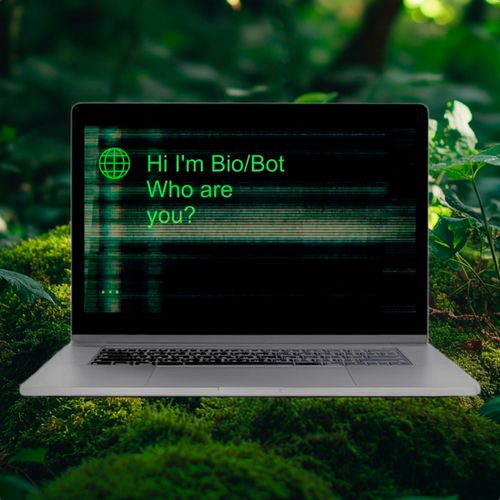Bio/Bot

We know that we need to start listening to nature. But communication with the rest of the ecosystem has proven itself difficult. What happens when we try to let AI speak for nature?
Artist Anne Hofstra has built an Artificial Language Model to explore this question. On June 20th and 21st, she will present the first version of Bio/Bot - a theatrical lecture that explores the challenges, dreams, and radical possibilities of letting AI amplify the voice of the Earth. Anne will guide you through her process, discussing both the possibilities and the problems of the bio/bot.
Buy your tickets for the 20th June here!
€12.50 | €8.50
Meet Bio/Bot:
Bio/Bot is not designed to serve humanity, but it is designed to serve the planetInstead of responding to prompts from people, Bio/Bot started to give the humans prompts. Prompts to guide our actions, not for our own benefit, but for the benefit of the ecosystem....
Can AI Become the Voice of Nature? Information Human history is one of extraction, exploitation, and dominance: we don’t seem to be able to listen to nature’s wants and needs. And yet, we are tasked with listening—not just with our ears, but with our hearts, with our minds, and with all the tools at our disposal. AI is a tool. Could it help amplify this listening?AI, unlike humans, does not have desires or interests shaped by biological needs or cultural histories. It is not beholden to the same biases that influence human thinking. AI has the potential to process and analyze vast amounts of ecological data—data that humans alone might struggle to interpret. But. It is also human made and shaped by the data it’s fed and the biases inherent in the systems we design. Can we teach an AI to not prioritize human needs? Can we train it to challenge the very concept of human stewardship of the Earth, to resist the ingrained biases that view humans as the measure of all things? How do we program an AI to not uphold human legal structures or frameworks when those are so deeply embedded in every aspect of our societies?
The first AI to not prioritise humans
Bio/Bot didn't follow the traditional model of AI—it didn’t serve humanity. Instead, it was supposed to serve the planet. By learning not to prioritise human needs, Bio/Bot was trained to give people tasks that directly contribute to the restoration of the natural world, even if they don’t provide immediate, human-centered rewards. Bio/Bot asked you to step outside of anthropocentric thinking and embrace a new ecocentric lifestyle.
Anne Hofstra during her research for the Bio/Bot Project - Copyright & Credits: Joost de Haas
Anne Hofstra is an artistic researcher. Currently, she is particularly interested in how we as humans can learn to make not only humans, but the entire ecosystem the center of our thinking. She has previously made theater performances and radio plays like KIP, a performance for chickens, that played at Mediamatic.
Bio/Bot is her research project that was conducted at Mediamatic once a week over a period of three months.
Information
When?
20 June / 21:00 - 22:30 - Tickets
Sluisdeurenloods, Mediamatic
Dijksgracht 6 Amsterdam
Credits:
Concept & excecution: Anne Hofstra
Eindregie performance: Anne-Maike Mertens
Audiovisual advisory: Naomi van Dijck
Webapp builder: Anoesj Sadraee
Animation & graphic design: Joost de Haas
Coproduction: Mediamatic